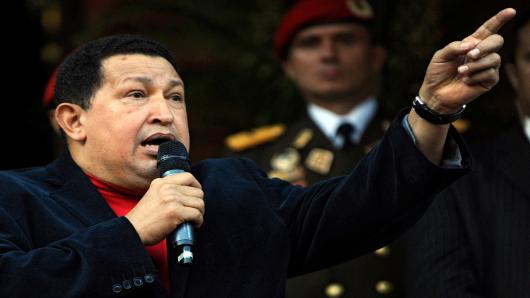In Venezuela politics and oil have become inseparable. But Hugo Chavez' health problems have sparked fears of a political vacuum in the oil-rich country that could jeopardize a multi-trillion dollar crude industry.
Venezuela is Latin America's biggest oil exporter and the fourth largest supplier of petroleum products to the United States. It also holds the world's largest oil reserves, surpassing Saudi Arabia, according to BP data. The state-owned Petroleos de Venezuela (PDVSA) manages the exploration and refining of oil, which accounts for almost 95 per cent of export earnings and 28 per cent of the Venezuelan GDP.
Venezuelans benefit from the cheapest gasoline in the world. They can fill up a tank for one dollar. But the country's lucrative oil industry is highly politicized and managed by pro-Chavez forces. Official figures put oil output levels at approximately 2.89 million barrels per day (bpd) down from 3.5 million bpd when Chavez took office in 1999. PDVSA no longer releases official data.
"PDVSA is loyal to Chavez, it's a very red company run by Chavistas," said James Williams of energy consultancy WTRG Economics. The new PDVSA describes itself as "red from the bottom to the top" and it will surely stand by Chavez's appointed successor Nicolas Maduro.
Oil revenue is used by Chavez to fund his social schemes ranging from free education (Bolivarian missions), to hospitals and homes for the poor. Ironically, the oil industry, which foots the bill for virtually everything, is suffering from a lack of investment itself. There has been no direct foreign investment in the industry for the past four years. Most recently, an explosion in Venezuela's largest refinery killed 41 workers and prompted criticism of mismanagement under Chavez' watch.
Chavez won control over the oil giant after PDVSA workers went on strike in 2002, following a coup d'tat staged by the opposition that saw him briefly removed from office. Oil production was halted for almost two months, pushing global fuel prices higher, as the Venezuelan economy sank into recession. The opposition argues that the so-called red PDVSA is poorly managed by the Chavistas; they've failed to make the most out of the country's vast natural resources while shipping free oil to fellow socialist states Cuba and Bolivia for political reasons.
"The 2002 strike had disastrous consequences for Venezuela and PDVSA, which lost some of its most efficient, valuable human capital," said Williams of WTRG Economics. "The risk of strike is small but we could see some tension if the opposition wins."
PVDSA bonds plunged last week ahead of Chavez' inauguration, which was postponed with the approval of Venezuela's supreme court. The opposition blasted the decision arguing that new election must be called within 30 days if the president-elect becomes "permanently" absent from office according to the constitution.
"We expect volatility to continue over the next three to six months," said Francisco Ghersi, managing director at Knossos Asset Management in Caracas specializing in PDVSA bonds.
"New elections seem inevitable. Chavismo without Chavez won't be as radical, they'll have to be more pragmatic, opening the door for new foreign investment," he added. Ghersi recommends PDVSA 2035, 2017 and 2022 bonds.
During the election campaign in October, Chavez promised to boost production, citing huge reserves of extra-crude oil in the Orinoco belt and new deals with China, but PDVSA has a history of missing its own targets. JPMorgan expects production to slow down by 1.4 per cent in 2013 and 2.5 per cent in 2014 if the current regime stays in power.
Meanwhile, Venezuelan authorities remain tight-lipped about Chavez's health after the socialist leader left for Cuba to undergo his fourth cancer operation since 2011. Official reports indicate that Chavez is conscious and fully aware of the "complex" situation. Specific details on his condition are yet to be released. Meanwhile, successor Nicolas Maduro has urged Venezuelans to ignore ill-intentioned rumours. Chavez has not been seen or heard in public since December 11.
El Comandante rose to power in 1999 vowing to improve the lives of millions of Venezuelans living in poverty. He is the leader of the Bolivarian revolution, a mix of socialism and populism named after Venezuela's liberation hero Simon Bolivar. Under Chavez, unemployment and poverty have dropped but violence and inflation have risen to record levels. He's been in office for 14 years.


